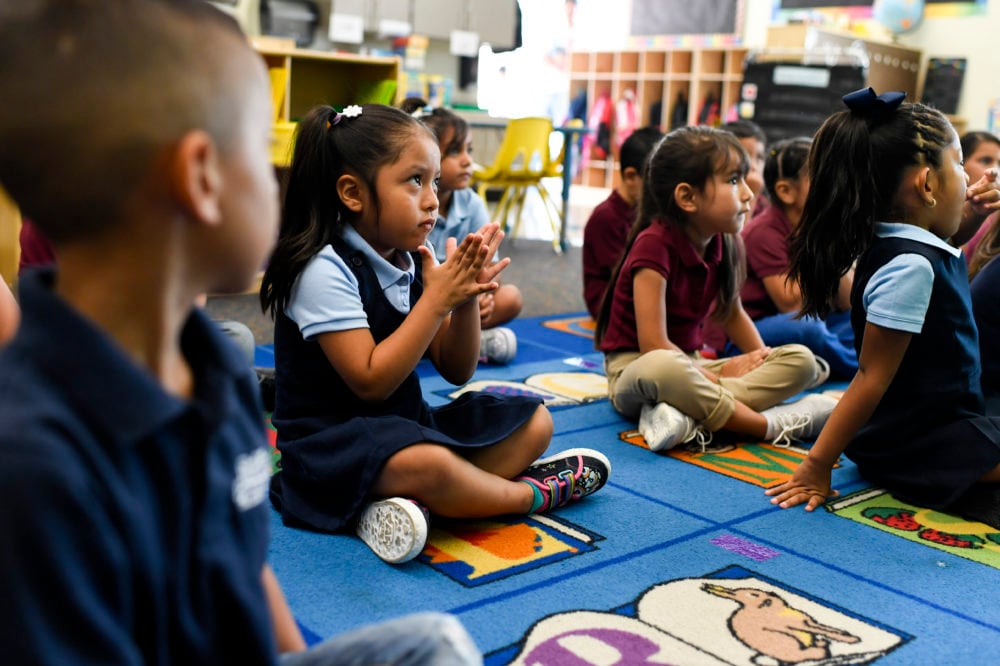Sign up for Chalkbeat Colorado’s free daily newsletter to get the latest reporting from us, plus curated news from other Colorado outlets, delivered to your inbox.
Following the release of a report that revealed “serious barriers” for Latino students in Denver Public Schools, the district has hired its first director of Latinx Student Success.
Patricia Hurrieta, currently principal of Grant Ranch Elementary School in southwest Denver, will begin her new role in the next few weeks, the district said. Hurrieta will lead a team tasked with carrying out the recommendations in the recently released 266-page La Raza Report commissioned by DPS.
“I am thrilled to collaborate with the community to address the recommendations outlined in the La Raza Report,” Hurrieta said in a press release. “Together, we will strive to create an environment that fosters the success and well-being of our Latinx/Hispanic students.”
More than half of the 88,000 students in DPS identify as Hispanic or Latino. About a third of DPS students, many of them native Spanish speakers, are learning English as a second language.
The La Raza Report noted the “indomitable cultural resilience … that is a part of the ethos of the various Latino groups in the Denver Public Schools.”
But the report authors wrote that their findings, which were based on historical research as well as 51 focus group interviews and thousands of survey responses, “surfaced some serious barriers that need to be addressed, including unequal resources across schools, … the serious mismatch between the Latino student population and the number of teachers and leaders in the system, and the perpetual undervaluing of the Latino cultures.”
“There are no cultural events for Latinos at most schools, according to the focus groups,” the report said. “Spanish-language classes are electives, and none of the students in the focus groups are taking them, even though many of the students are fluently bilingual.
“Many students also said that they had never read a book written by or about Latinos.”
Spurred in part by a similar report about the barriers encountered by Black students and staff, the district created a Black Student Success team earlier this school year, also led by a former DPS principal. That team is working with university researchers who are studying the teaching methods of DPS teachers whose Black students made stellar academic progress. The goal is to spread those methods throughout the district, starting with a cohort of six elementary schools.
Each team — the Black Student Success team and the Latinx Student Success team — will have a budget of $750,000 next school year, said Joe Amundsen, the district’s executive director of school transformation, whose department works with both teams.
DPS has commissioned many reports and task forces over the years to make recommendations that community members have perceived as going nowhere — a frustration that’s clear in the La Raza Report. But Amundsen said hiring someone like Hurrieta to do the work, and allocating funding to complete it, signals a different level of commitment from DPS.
“There’s a difference in that commitment, which is translating to more than committees and recommendations, but let’s take those recommendations and really do something that is going to impact outcomes for kids,” he said. “It’s got more teeth to it.”
An advisory committee of Latino leaders and community members is helping the district prioritize which of the 35 La Raza Report recommendations the new Latinx Student Success team should tackle first, Amundsen said.
The recommendations include:
- Establish student tutoring programs funded by Denver employers.
- Develop a transportation system with the city and RTD for students and families “even in those areas where providing such a service may not be cost-effective but is socially just.”
- Increase the number of students participating in the Seal of Biliteracy, which allows students to demonstrate proficiency in English and another language.
- Develop a districtwide bilingual parent leadership institute focused on understanding the DPS educational system and the roles parents can play in their children’s education.
- Expand the pool of Spanish-speaking teachers, as well as establish a pipeline for Latino school and district leaders and a Latino leadership mentorship program.
- Consider redrawing the boundaries for West High School and periodically review all school boundaries to account for gentrification and other population shifts.
- Have central office employees undergo cultural sensitivity and competence training.
Although the Latinx Student Success team will take the lead on many of the recommendations, Amundsen stressed that “this is the responsibility of the entire district.”
Melanie Asmar is the bureau chief for Chalkbeat Colorado. Contact Melanie at masmar@chalkbeat.org.






